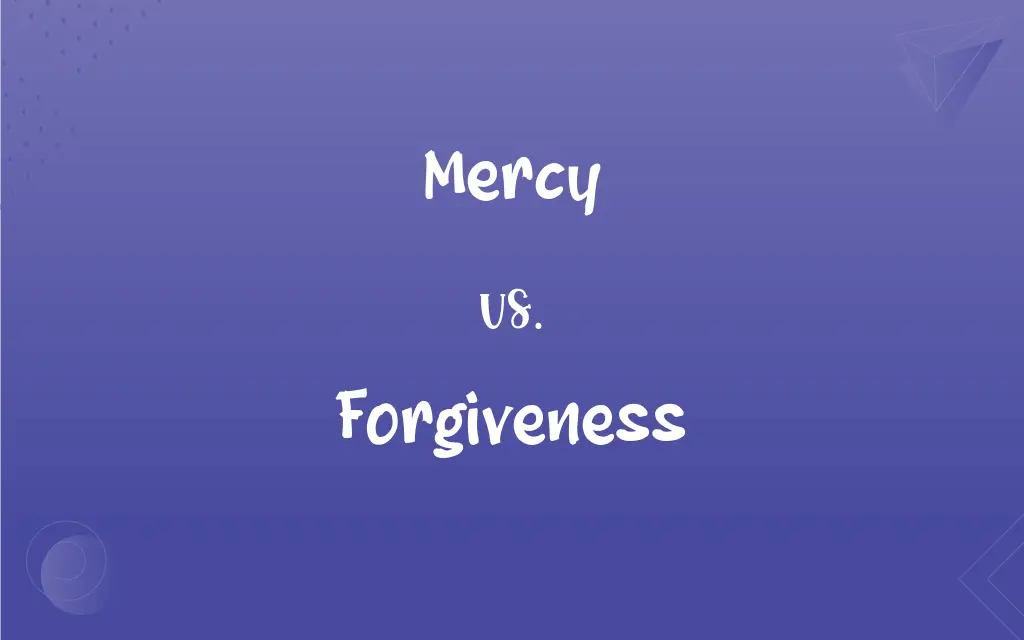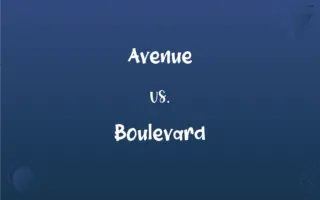Mercy vs. Forgiveness: What's the Difference?
Edited by Aimie Carlson || By Harlon Moss || Published on November 27, 2023
Mercy is showing compassion or leniency, often when one has the power to punish, while forgiveness is letting go of resentment or the desire for revenge against a wrongdoer.

Key Differences
Mercy and forgiveness, although closely related, are distinct in meaning and application. Mercy often deals with showing compassion, leniency, or withholding punishment when one has the authority or right to exact it. For instance, a judge might show mercy by giving a lesser sentence than what could have been assigned.
Conversely, forgiveness is about releasing resentment, anger, or the desire for revenge against someone who has caused harm or committed an offense. It's an internal process that allows one to move past feelings of bitterness or the need for retribution. Someone might forgive a friend for a past transgression, signaling that they've let go of their feelings of hurt.
Additionally, mercy is more about the actions of the one in power or the one bestowing it. It's a choice to show kindness or leniency. For example, a person might spare a spider in their home, demonstrating mercy by choosing not to kill it.
In contrast, forgiveness revolves around the feelings and emotional healing of the one who was wronged. It's a journey of the heart that often takes time and introspection. A person might take years to forgive a deep betrayal, but once achieved, it often brings peace.
Moreover, while mercy can be shown without forgiveness—like a ruler pardoning a rebel without forgetting the rebellion—forgiveness can exist without mercy. One might forgive a wrongdoer internally but still believe in the necessity of a penalty or consequence.
ADVERTISEMENT
Comparison Chart
Primary Focus
Action
Feeling
Relates To
Compassion, leniency
Letting go of resentment
Involves
Often a decision by someone in power
An internal process by the one wronged
Outcome
Withholding or lessening punishment
Emotional healing and release
Can exist without the other
Yes (e.g., leniency without internal forgiveness)
Yes (e.g., emotional release without showing leniency)
ADVERTISEMENT
Mercy and Forgiveness Definitions
Mercy
Kind or forgiving treatment of someone in distress.
She took mercy on the injured bird and nursed it back to health.
Forgiveness
The act of absolving someone from blame.
He granted her forgiveness for the oversight.
Mercy
Leniency or clemency, especially when undeserved.
The teacher's mercy allowed the student to retake the test.
Forgiveness
Restoring a relationship after an offense.
Their bond grew stronger after mutual forgiveness.
Mercy
Compassion shown to someone, especially when in a position to punish.
The king showed mercy by sparing the rebel's life.
Forgiveness
A conscious decision to let go of negative emotions related to a wrong.
Through therapy, she learned the power of forgiveness.
Mercy
A disposition to be kind and compassionate.
His mercy was evident when he volunteered at the shelter.
Forgiveness
The action of pardoning someone for a mistake or offense.
She sought forgiveness from her friend after the argument.
Mercy
A blessing or act of divine favor.
They considered the rain after a long drought as an act of mercy.
Forgiveness
Releasing feelings of resentment or vengeance.
Forgiveness allowed him to move on from past hurts.
Mercy
Compassionate treatment, especially of those under one's power; clemency.
Mercy
A disposition to be kind and forgiving
A heart full of mercy.
FAQs
Can you show mercy without forgiving?
Yes, one can be lenient without internally forgiving the offense.
Is forgiveness always an immediate process?
No, forgiveness can be a lengthy emotional journey.
Can mercy lead to forgiveness?
Yes, acts of mercy can sometimes pave the way for forgiveness.
Does everyone deserve mercy?
Views vary, but many believe that everyone deserves a chance at mercy.
Is mercy the same as forgiveness?
No, mercy is about compassion or leniency, while forgiveness is about releasing resentment.
Is forgiveness a sign of weakness?
No, many view it as a sign of strength and emotional maturity.
Can an act of mercy be undeserved?
Yes, mercy can be shown even when not deserved.
Is mercy a universal value?
While interpretations vary, many cultures value mercy in some form.
Is self-forgiveness important?
Yes, forgiving oneself can be crucial for personal healing and growth.
Is forgiveness always reconciliatory?
Not necessarily. One can forgive without reconciling a relationship.
Is forgiveness beneficial for the one forgiving?
Yes, it often brings peace and emotional healing.
Can mercy be shown to oneself?
Absolutely. Self-compassion and leniency are forms of self-mercy.
Is it possible to forgive serious offenses?
It varies by individual, but many have found the strength to forgive even grave wrongs.
Does mercy always involve a power dynamic?
Often, but not always. Mercy can also be simple acts of kindness.
Can you ask for mercy without seeking forgiveness?
Yes, one can seek leniency without necessarily asking for emotional pardon.
Does forgiving mean forgetting?
No, one can remember the offense but choose to let go of the resentment.
How can one practice forgiveness?
Through introspection, empathy, understanding, and sometimes external support or therapy.
Does mercy have religious connotations?
In many religions, yes. Acts of divine mercy are common themes.
Can societies show collective mercy?
Yes, through policies, pardons, or cultural shifts.
Why is forgiveness sometimes hard?
Due to deep emotional hurts, perceived severity of the offense, or personal beliefs.
About Author
Written by
Harlon MossHarlon is a seasoned quality moderator and accomplished content writer for Difference Wiki. An alumnus of the prestigious University of California, he earned his degree in Computer Science. Leveraging his academic background, Harlon brings a meticulous and informed perspective to his work, ensuring content accuracy and excellence.
Edited by
Aimie CarlsonAimie Carlson, holding a master's degree in English literature, is a fervent English language enthusiast. She lends her writing talents to Difference Wiki, a prominent website that specializes in comparisons, offering readers insightful analyses that both captivate and inform.






































































